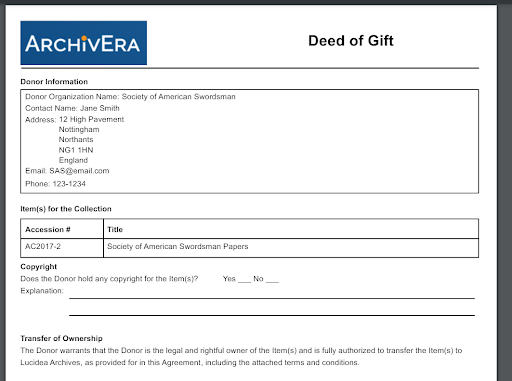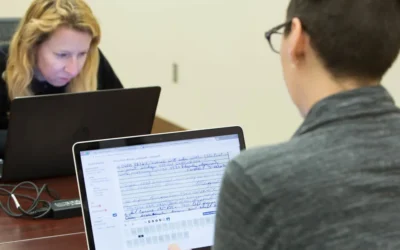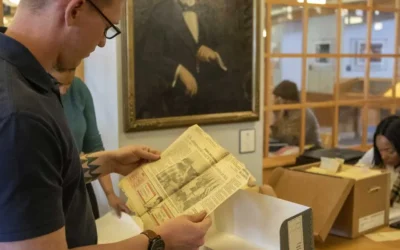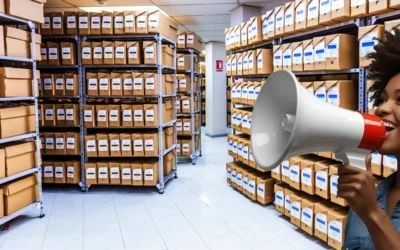Understanding Deeds of Gift
In archives, the importance of deeds of gift cannot be overstated. These legal documents are the cornerstone for acquiring historical materials and ensuring their preservation.
A deed of gift is a legal instrument that transfers ownership of archival materials from the donor to the repository. It establishes the terms and conditions under which the materials are donated, including access, use, or reproduction restrictions. The contract outlines the rights and responsibilities of the donor and archives.
What to Include
In a deed of gift, include the full names, addresses, and contact information of the donor(s) and the recipient repository. Doing so ensures that both parties are identified and can be reached if necessary.
Provide a detailed description of the donated items, including relevant information such as titles, dates, creators, and conditions. A full description helps establish what is being transferred and ensures no ambiguity about the gift’s contents.
Clearly state that the donor transfers ownership of the items to the repository. This allows the donor to relinquish ownership rights and establishes the repository as the new owner.
If the donated gift entails conditions or restrictions, such as limitations on access, use, or reproduction, it is imperative to outline these stipulations in the deed of gift. This comprehensive approach ensures transparency and clarity for both parties involved, elucidating any constraints associated with the donation.
In addition to outlining limitations, address copyright considerations. The deed should clarify whether the donor retains copyright, transfers it to the repository, or grants specific permissions. Moreover, it should detail any permissions or licenses required for the repository to fulfill its intended purposes, such as providing access, making reproductions, or distributing materials. Clear delineation of copyright responsibilities ensures legal compliance and mitigates potential future disputes over intellectual property rights.
Include a statement acknowledging that the repository has accepted the gift and agrees to abide by the terms outlined in the deed of gift. This confirms that both parties agree and have consented to the transfer of ownership.
Once both parties are satisfied with the terms outlined in the deed of gift, the donor should sign it and be an authorized representative of the repository. This formalizes the donation process and signifies mutual agreement to abide by the terms of the deed. Both parties’ signatures validate the ownership transfer and establish the repository’s custodial responsibilities for the donated materials.
Specify whether both parties will retain copies of the deed of gift and how they will be stored for future reference. This helps to ensure that there is a record of the transaction in case any disputes arise in the future.
Seek Legal Advice
Drafting and reviewing deeds of gifts involve legal intricacies that donors may not be familiar with. Seeking legal advice ensures that legal requirements are met and that the interests of both parties are protected. Experts can guide repositories on copyright issues, privacy concerns, and other legal considerations from donations. By consulting with professionals, donors can have peace of mind. At the same time, repositories can ensure compliance with regulations governing the acquisition and management of archival materials.
Thoroughly review the draft deed of gift to ensure that all terms accurately reflect intentions and expectations. Consider feedback from donors or legal counsel and make necessary revisions or clarifications to the document.
Maintain Open Communication
Communication between donors and repositories is essential for a successful donation process. Both parties should feel comfortable raising concerns and asking questions at any stage. Updates on the donation status, including any changes or developments, help foster trust. Communication allows for prompt resolution and prevents misunderstandings. By keeping the lines of communication open, donors and repositories can navigate the donation process.
Consider Long-Term Implications
Donating archival materials is not just a one-time transaction; it has long-term implications for donors and repositories. When drafting deeds of gift, repositories should consider the future preservation, access, and use of materials. Discuss preservation methods, access policies, and potential uses of the materials with repository staff. Likewise, repositories should consider how donated materials fit into their existing collections and how they will be managed in the coming years.
Transferring Materials
Following signing the deed of gift, the donor can transfer the materials to the repository according to the agreed-upon arrangements. This may involve shipping the materials securely or arranging for in-person delivery. The repository staff will facilitate the accessioning process, which includes cataloging, preserving, and providing access to the donated materials following the terms of the deed of gift.
Lucidea’s ArchivEra archival CMS can help with deeds of gift! After you fill out an accession record in ArchivEra you can print a deed of gift report. The deed of gift report will pull data from the accession record, including donor information and information about the accession and put it in a nicely formatted deed of gift. You can configure the report to include whatever legal text is required by your archives and include branding, e.g., your logo. The deed of gift report can be sent to the donor for signature and then attached to the accession record.

Express Gratitude
Donors play a vital role in preserving shared cultural heritage, and their generosity should be acknowledged. Expressing gratitude to donors for their contributions fosters goodwill and strengthens the relationship between donors and repositories. Sending thank-you notes or acknowledging donors in archival records can show appreciation for their support. By recognizing the importance of their contributions, donors are more likely to feel motivated to continue supporting the preservation of historical materials. Gratitude also extends to the broader community of researchers, historians, and enthusiasts who benefit from access to archival collections, reinforcing the importance of preserving the collective memory and understanding of the past.
Deeds of gift play a crucial role in acquiring and preserving archival materials. By carefully crafting these documents, donors and repositories can ensure that valuable historical materials are protected and accessible for future generations.
Learn more about ArchivEra: the leading archival collections management system (CMS) for progressive archivists in institutions of all sizes and budgets.
Never miss another post. Subscribe today!
Similar Posts
Collaborative Archival Relationships
Collaborative projects are instrumental in showcasing how archival collections can benefit various organizational departments.
Informational, Evidential, and Intrinsic Values within Archives
Archives provide authentic, reliable information and hold values that reflect their functions and uses; informational, evidential, and intrinsic.
A Sustainable Archives
Archivists prioritize sustainable practices and policies, rooting their work in ethics of care, often preferring digital processing and preservation
Archival Branding and PR Strategies
Archivists who adopt branding and PR strategies both safeguard historical treasures and contribute to their organizations’ evolution.




Leave a Comment
Comments are reviewed and must adhere to our comments policy.
0 Comments